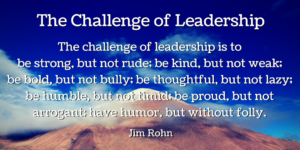
People matter.
Leadership matters.
You can’t have sustained success if you don’t get the right people in the right seats on the bus.
It’s a simple concept, but oh so hard to make happen in the real world where personalities, egos, politics and styles so often clash. And these days it seems that compromise has become a dirty word and so we often end up in an endless cycle of gridlock.
At the heart of conflicts we can usually find a difficult personality—maybe an egomaniac or a narcissist or some other type of charmer.
Sometimes they are dolts and I’m guessing we can all think of a few. And sometimes they are brilliant visionaries or technicians who are wildly talented but fundamentally lacking in emotional intelligence—the most important kind.
What happens next is sadly predictable. Because of their talent or their ego, they are often able to ascend to great heights but they inevitably crash and burn because their deficiencies in dealing with other people eventually become a fatal flaw.
Unfortunately, they often leave a whole lot of damage in their wake.
I was thinking about this phenomena last week when I read a slew of stories about the rise and fall of We Work founder Adam Neumann who only days ago was riding high atop the world’s most valuable start-up only to see the value of his vision plummet and to have the very people who threw money at him take him out.
Why?
Because Mr. Neumann– clearly a genius on so many levels–flew too close to the sun. He talked about being president of the world (not making that up), engaged in questionable self-dealing with his own company and smoked marijuana on planes which annoyed pilots and unnerved investors.
And then it ended, before his company could launch its long awaited IPO. Oh and they lost billions in value along the way.
A similar fate befell the egotistical founder of Uber, countless politicians at all levels of government and to some extent Steve Jobs, the legendary Apple founder who was bounced from his own company before becoming the rare (somewhat) humbled egomaniac to come back and have a successful second act.
The problem is these types of personality types leave a ton of damage in their wake.
The key is to try and recognize these types and prevent them from getting into positions where they blow up people, cultures and institutions.
The challenge in stopping them is significant because their swagger, sense of entitlement and boundless self-confidence often lands them coveted positions. In America, we have this myth of the white knight that will show up and solve all of our problems. Yes, talented leaders can help to solve a host of issues, but (and this is a big but) nobody can do it alone.
You can’t run Uber or We Work by yourself, you can’t lead a city by yourself and you can’t lead a nation by yourself either.
You need a team of empowered people who work well together, trust each other, root for one another and believe passionately in the mission. And you need a leader who shares credit and is willing to take responsibility when the going gets rough and it always gets rough. There’s no such thing as an overnight success, you need troops and troops won’t follow an egomaniac, a bully or a narcissist forever.
The egotist may get far, but he or she won’t last. The behavior gets old. At first, it happens slowly, then all at once.
We Work’s Neumann was the charming rogue before his indulgences sunk him. Uber’s Travis Kalanick was the maverick who delighted in putting a thumb in your eye before his over the top “bro” culture saw him bounced from his creation and we’ve all seen politicians whose hubris (fatal arrogance) cost them elections and in some cases their freedom.
It never ends with a parade and when these beauties leave they are never remembered fondly.
The truth about real leaders is that they make you feel safe when they are there, they inspire people to do more, be more and they plant seeds that blossom long after they leave. They develop others who carry the mission further.
This is not an argument against disruption, we need innovators who can show us a better way. But too often disruption means destroying institutions that matter. We risk a lot when we start to pull threads without stopping to think why those threads were sewn in the first place.
It’s not a choice between disruption and stewardship—you can do both. You can innovate and make sure to take care of the organization you’ve been tasked to lead.
You can be a disruptive bully or a servant leader. But you can’t be both.
One style works and leads to transformational and positive change, the other style leads to failure. History never remembers the bullies with affection.
